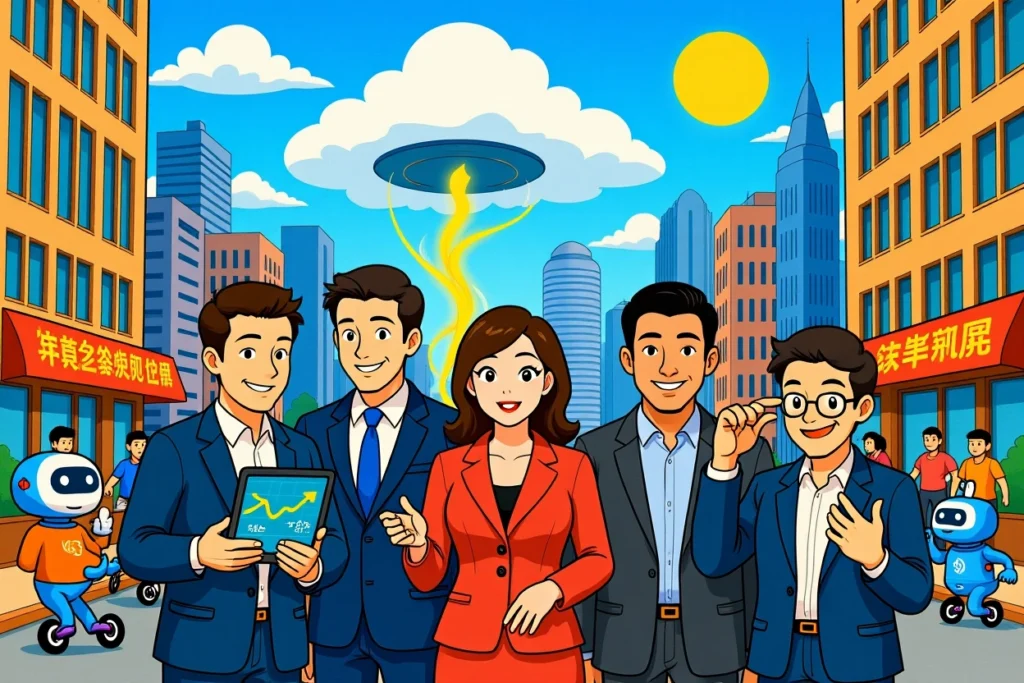Key Developments
– Elon Musk (埃隆·马斯克) publicly accused Apple of antitrust violations through its App Store ranking algorithm on August 11, claiming it systematically favors OpenAI
– Musk announced immediate legal action from his artificial intelligence company xAI against Apple’s alleged anti-competitive practices
– Data reveals OpenAI’s ChatGPT dominates as the #1 free iPhone app in the U.S., while Musk’s Grok ranks fifth despite similar functionality
– This confrontation could escalate into one of the most significant legal battles between tech giants since Epic Games vs Apple
– Industry analysts warn the outcome may reshape app distribution policies and AI competition landscapes globally
The Spark: Musk’s Explosive Allegations
On August 11, tech billionaire Elon Musk (埃隆·马斯克) ignited a corporate firestorm through a series of posts on his social media platform X. Musk directly accused Apple of engineering its App Store ranking system to prevent any artificial intelligence company except OpenAI from reaching the top position. “Apple has made it impossible for any AI firm besides OpenAI to rank #1 on the App Store,” Musk declared. “This constitutes a clear antitrust violation.” He punctuated his accusations by questioning whether Apple was deliberately “playing politics” through its ranking methodology.
The timing proved significant, coming just weeks after Apple announced its partnership with OpenAI to integrate ChatGPT into iOS 18. Musk’s criticism appeared prominently pinned atop his X profile for maximum visibility, signaling this wasn’t a passing grievance. Within hours, he followed through by announcing that xAI—his artificial intelligence startup—would pursue immediate legal recourse against the Cupertino-based tech behemoth.
This confrontation didn’t emerge in isolation. The U.S. Department of Justice had already filed a sweeping antitrust lawsuit against Apple in March 2024 (https://www.justice.gov/opa/pr/justice-department-sues-apple-monopolizing-smartphone-markets), alleging the company “undermines apps, products, and services that would otherwise make users less reliant on the iPhone.” Musk’s allegations specifically target how Apple’s ranking algorithms allegedly manipulate market visibility—a central concern in existing antitrust investigations.
App Store Rankings: The Invisible Hand
Apple’s App Store ranking system operates through proprietary algorithms considering factors like download velocity, user engagement, and review ratings. However, developers have long expressed frustration about its opacity. Appfigures data indicates that a #1 ranking can increase download volume by 300-800% compared to a #5 position—making algorithmic favoritism potentially devastating for competitors.
When asked about ranking transparency at a 2023 developer conference, Apple Fellow Phil Schiller (菲尔·席勒) stated: “Our focus remains on delivering the best user experience, not engineering outcomes for specific developers.” Musk’s allegations directly challenge this assertion by implying deliberate manipulation against certain AI companies. The controversy echoes 2020 accusations from Spotify and Match Group about Apple allegedly favoring its own services.
Evidence and Market Reality
Current market data lends circumstantial weight to Musk’s antitrust violation claims. According to Sensor Tower analytics, OpenAI’s ChatGPT has maintained its position as America’s most downloaded free iPhone application for 14 consecutive weeks. Meanwhile, Musk’s comparable AI chatbot Grok—despite launching with substantial publicity—peaked at #5 before settling into the #7-12 range. This discrepancy persists despite both applications offering free access, conversational interfaces, and real-time information retrieval.
Industry analysts note several anomalies in ChatGPT’s dominance. Unlike viral social apps like TikTok that achieved #1 through organic user growth, ChatGPT’s download patterns show unusual consistency despite lacking social sharing features or gaming mechanics typically associated with top-ranked apps. Mobile ecosystem expert Eric Seufert notes: “When an app maintains pole position without network effects or entertainment value, it warrants scrutiny about external factors influencing visibility.”
The OpenAI Anomaly
Apple’s relationship with OpenAI has deepened considerably since May 2024, when CEO Tim Cook (蒂姆·库克) announced ChatGPT integration into iOS. Internal emails revealed in Epic Games’ lawsuit showed Apple executives discussing how featuring specific apps could “make or break” developers. While Apple hasn’t officially “featured” ChatGPT since June, its sustained #1 ranking suggests algorithmic advantages.
Notably, other AI competitors show similar suppression patterns. Anthropic’s Claude AI has never breached the top 50 despite strong web traffic, while Microsoft’s Copilot languishes around #35. Only Google’s Gemini has reached #2—coinciding with Apple’s ongoing negotiations to license Gemini for future iOS features according to Bloomberg reports. This pattern fuels antitrust violation concerns about Apple picking winners through technical rather than merit-based criteria.
Legal Precedents and Antitrust Violation Framework
Musk’s threatened lawsuit would unfold against a backdrop of established antitrust litigation targeting Apple’s ecosystem control. The landmark 2021 Epic Games v. Apple case established that Apple holds monopoly power over iOS app distribution, though the court stopped short of declaring the App Store itself illegal. Crucially, Judge Yvonne Gonzalez Rogers wrote: “Apple’s anti-steering provisions hide critical information from consumers and illegally stifle consumer choice.”
Legal experts identify three pillars supporting Musk’s antitrust violation argument under the Sherman Act: monopoly leveraging (using App Store control to advantage partners), refusal to deal (allegedly suppressing competing AI apps), and algorithmic discrimination. Columbia Law professor Tim Wu (吴修铭) observes: “If discovery proves Apple tuned its algorithm to preference OpenAI, that becomes textbook monopolization through artificial market distortion.”
The European Union’s Digital Markets Act (DMA) already forced Apple to allow alternative app stores and payment systems in Europe—a regulatory framework U.S. lawmakers closely study. Apple’s compliance document admits the DMA “required changes to the iOS App Store that compromise our ability to detect, prevent, and take action against malicious apps.” This concession undermines Apple’s longstanding security arguments against opening its ecosystem.
xAI’s Legal Pathway
xAI’s anticipated lawsuit would likely combine three approaches: requesting injunctive relief to force App Store algorithm transparency, seeking monetary damages for suppressed downloads/revenue, and petitioning regulators for structural remedies. Legal precedents suggest discovery could prove pivotal—if internal Apple communications reveal deliberate suppression of competitors, it would powerfully substantiate antitrust violation claims.
Notably, Musk retains Quinn Emanuel litigator Alex Spiro (亚历克斯·斯皮罗)—who successfully defended Musk in the 2022 Tesla funding trial—suggesting preparation for courtroom warfare. Spiro specializes in extracting damning evidence from corporate communications, as demonstrated when he uncovered Twitter’s security flaws during Musk’s acquisition litigation.
Broader Implications for Tech Competition
This confrontation transcends personal rivalry between Musk and Apple CEO Tim Cook (蒂姆·库克). It represents a critical stress test for platform neutrality in the AI era. As generative AI becomes embedded in mobile operating systems, allegations of algorithmic favoritism could determine whether startups compete fairly against entrenched players. The Federal Trade Commission’s 2023 policy statement explicitly warned against “algorithmic discrimination that disadvantages rivals”—a framework directly applicable here.
Consumer advocates argue that suppressed competition ultimately harms innovation and choice. “When platform owners manipulate visibility, they effectively decide which technologies succeed,” warns Open Markets Institute director Barry Lynn. “That’s fundamentally anti-innovation and anti-consumer.” The outcome could influence pending legislation like the Open App Markets Act, which would mandate platform neutrality and sideloading rights.
Global Regulatory Domino Effect
Should Musk proceed with litigation, international regulators would likely amplify scrutiny. The European Commission already has an open investigation into Apple’s App Store policies under the DMA. Japan’s Fair Trade Commission recently raided Apple’s Tokyo offices over alleged antitrust violations with Japanese developers. Simultaneously, Britain’s Competition and Markets Authority is examining whether Apple and Google’s “effective duopoly” stifles cloud gaming and AI app distribution.
China’s State Administration for Market Regulation (SAMR) presents particularly high stakes. As Apple’s third-largest market, Chinese regulators have previously forced Apple to remove 60,000 unlicensed game apps. Should SAMR substantiate Musk’s antitrust violation allegations, it could demand algorithmic transparency or revenue-sharing concessions—setting precedents with global ramifications.
Navigating the Impending Legal Battle
The path forward contains multiple inflection points. Apple’s legal team could preemptively offer settlement terms involving algorithm transparency or featuring commitments for competing AI apps. Alternatively, Musk might escalate through formal complaints to the FTC and international regulators before filing suit. Historical patterns suggest Apple will defend its algorithms as neutral quality measurements while avoiding discovery of internal decision-making processes.
For developers and consumers, the most significant outcome would be binding precedents about platform neutrality. As Stanford Law professor Mark Lemley notes: “This could become the case that finally establishes whether ‘algorithmic neutrality’ is an antitrust requirement for dominant platforms.” App developers universally support mandated transparency, with Coalition for App Fairness executive director Rick VanMeter declaring: “Sunlight is the best disinfectant for app store favoritism.”
Immediate Industry Reactions
Following Musk’s accusations, several prominent figures voiced support. Meta CEO Mark Zuckerberg (马克·扎克伯格) liked Musk’s critical posts—a significant gesture given their historic rivalry—while Spotify CEO Daniel Ek tweeted: “App Store black boxes hurt consumers and innovation alike.” Simultaneously, Apple allies like Salesforce co-CEO Marc Benioff publicly defended Apple’s “curatorial integrity.”
Market responses proved immediate though muted. Apple shares dipped 0.8% in after-hours trading following Musk’s posts, while Microsoft (OpenAI’s largest investor) gained 1.2%. More significantly, venture capital firm Andreessen Horowitz paused new investments in consumer AI apps, citing “platform dependency risks highlighted by recent events.” This chilling effect on AI innovation underscores the stakes beyond corporate litigation.
Strategic Considerations Moving Forward
For technology companies navigating this landscape, several proactive measures become essential. First, document any ranking anomalies through daily download tracking and user acquisition metrics. Second, diversify distribution beyond walled gardens—progressive web apps (PWAs) now achieve 85% of native app functionality without store restrictions. Third, engage proactively with regulators; the FTC actively solicits developer complaints about platform misconduct.
Consumers wield unexpected influence through class action possibilities. The 2020 Pepper v. Apple decision established iPhone users’ standing to sue over App Store policies. Should evidence emerge that ranking manipulation deprived consumers of superior alternatives, consumer lawsuits could supplement regulatory actions. As Harvard professor Lawrence Lessig famously argued: “Code is law”—meaning technical architectures like App Store algorithms require democratic accountability.
Ultimately, this antitrust violation confrontation may accelerate industry-wide shifts. Web3 advocates propose decentralized app stores using blockchain verification, while progressive web apps bypass stores entirely. Microsoft now allows direct sideloading of Windows apps, and Google permits third-party Android stores. Even Apple conceded to EU pressure—signaling walled gardens may crumble regardless of litigation outcomes.
The Road Ahead
Elon Musk (埃隆·马斯克) has thrown a grenade into the delicate ecosystem of mobile app distribution, with Apple’s App Store policies squarely in the blast radius. His allegations of antitrust violations strike at the heart of platform power in the AI era—where algorithmic visibility determines market winners. While legal processes unfold slowly, the marketplace has already rendered preliminary judgment: developers increasingly hedge against single-platform dependence, regulators sharpen their scrutiny, and consumers grow wary of curated digital experiences.
The coming months will reveal whether Musk’s legal offensive forces meaningful App Store reforms or reinforces Apple’s control. Regardless of courtroom outcomes, this confrontation signals that platform governance will dominate technology policy debates through 2025 and beyond. As artificial intelligence becomes increasingly embedded in our digital experiences, ensuring fair competition through transparent algorithms becomes not just a legal imperative, but a technological necessity.
Monitor regulatory dockets at justice.gov/atr and ftc.gov for developments. Support legislative efforts promoting app store transparency through contact with congressional representatives. Most crucially, vote with your attention and dollars—explore alternative AI platforms beyond the top-ranked options, because competitive markets thrive through informed consumer choice.




